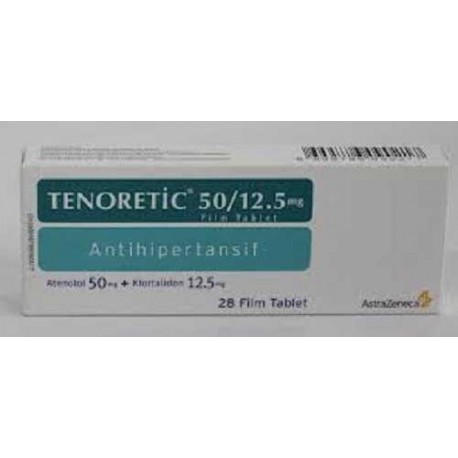 View larger
View larger Tenoretic (Tenormin Atenolol) Tablets
New product
BUY MORE PAY LESS
| Quantity | Discount | |
|---|---|---|
| 2 | 5% | |
| 3 | 10% | |
| 4 | 15% | |
| 5 | 20% |
Volume discounts
| Quantity | Discount | You Save |
|---|---|---|
| 2 | 5% | Up to $3.20 |
| 3 | 10% | Up to $9.60 |
| 4 | 15% | Up to $19.20 |
| 5 | 20% | Up to $32.00 |
More info
TENORETIC 50 / 12.5 mg film tablet It is administered orally.
Active ingredient
Each film-coated tablet contains 50 mg atenolol and 12.5 mg chlorthalidone.
Excipients
Heavy magnesium carbonate, corn starch, sodium lauryl sulfate, gelatin, magnesium stearate, methylhydroxypropylcellulose, glycerol, titanium dioxide
What is Tenoret and what is it used for?
Tenoretic is used to treat high blood pressure (hypertension). It contains two different drugs: atenolol and chlorthalidone. These drugs work together to lower your blood pressure.
• Atenolol belongs to a group of drugs called "beta blockers". It works by making your heart beat slower and with less force.
• Chlortalidone belongs to a group of drugs called "diuretics". It works by increasing the amount of urine produced by your kidneys.
TENORETIC 50 mg / 12.5 mg are round white film-coated tablets, marked on one side. It is available in blister packs containing 28 tablets.
3.How to use TENORETIC?
Instructions for proper use and dose / frequency of administration
Always use Tenoret 50 mg / 12.5 mg as your doctor has described for you. If you are not sure how to use it, consult your doctor or pharmacist.
• Your doctor will give you information about how many tablets a day and when to take. Read the label on the box to remember what your doctor has told you.
Application route and method
• Swallow your TENORETIC tablet with a glass of water.
Adults
The usual dose for adults is one tablet per day.
Different age groups
Use in children
Use in the elderly
Use in the elderly
The normal daily dose is one tablet.
If you have an observation that the effect of TENORETIC is too strong or too weak, talk to your doctor or pharmacist.
If you use more TENORETIC than you should
If you have used more than you should use from Tenoret, talk to a doctor or pharmacist immediately or go to a hospital.
Take the medicine package with you so that the tablets can be identified.
If you forget to use TENORETIC
If you forget to take your medicine, take this dose as soon as you realize that you have forgotten. If the next dose is close when you remember, skip the missed dose.
Do not take a double dose to make up for forgotten doses.
4. What are the possible side effects?
Like all medicines, there may be side effects in people who are sensitive to the substances contained in Tenoret.
Allergic reactions:
If an allergic reaction occurs, consult your doctor immediately. Symptoms can include rashes on your skin or swelling of your face, lips, mouth, tongue, or throat.
Other possible side effects:
Common (affecting less than 1 in 10 people)
• Cold hands and feet.
• You may notice a slower heart rate while taking the tablets. This is normal, but if you are worried, please let your doctor know.
• Diarrhea1.
• Feeling sick (nausea).
• Feeling tired.
• Changes in the amount of certain substances in your blood. It can cause:
higher than normal blood sugar (glucose) level,
low sodium level, which can cause weakness, feeling sick (vomiting) and cramps
- low potassium level,
- increased uric acid content.
To check these levels, your doctor may want to take blood samples frequently.
Uncommon (less than one in 100 people)
• Restless sleep.
Rare (less than one in 1000 people)
• Heart block (may cause abnormal heartbeat, dizziness, tiredness or fainting).
• Temperature increase and pain following numbness and spasm in the fingers (Raynaud's disease).
• Dizziness (especially when standing up).
• Headache.
• Confusion.
• Personality changes (psychoses) or hallucinations.
• Mood changes.
• Nightmares.
• Dry mouth.
• Thinning of hair.
• Dry eyes.
• Skin rash.
• Tingling of the hands.
• Visual disturbances.
• Bruising more easily or purplish spots on the skin.
• Inability to get an erection (impotens)
• Jaundice (causes yellowing of the skin or the whites of the eyes).
Pancreatitis (inflammation of the large gland at the back of the stomach).
• Decrease in the number of white blood cells.
Very rare (affecting less than 1 in 10 000 people)
Changes in some cells or other parts of the blood. To check whether Tenoret is affecting your blood, your doctor may want you to have frequent blood tests.
Conditions that can get worse
If you have one of the following conditions, it may get worse when you start taking your medicine. This occurs infrequently, affecting less than one person in 1,000:
• Psoriasis (a skin disease).
• Shortness of breath or swollen ankles (if you have heart failure).
• Asthma or breathing problems.
• Circulatory impairment.
These side effects shouldn't worry you. None of these may be seen in you.

